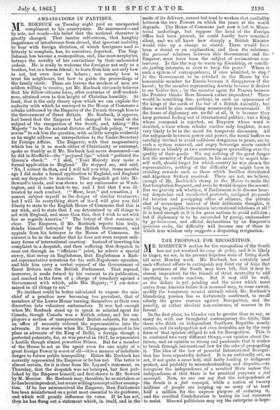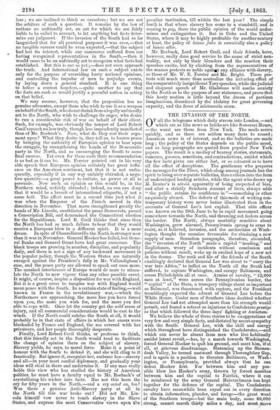THE PROPOSAL FOR RECOGNITION.
MR. ROEBUCK'S motion for the recognition of the South has not yet received its coy cle grtice, and it is likely to linger, we see, in its present hopeless state of living death till next Monday week. Mr. Roebuck has certainly used such effectual efforts to extinguish any faint ray of hope that the partizans of the South may have felt, that it may be almost imprudent for the friends of strict neutrality to add anything to excite reaction. But it may still be well, as the debate is yet pending and the news which must arrive from America before it is resumed may, to some extent, modify the temporary mental attitude which Mr. Roebuck's blundering passion has so fortunately confirmed, to recall calmly the grave reasons against Recognition, and the paucity, or rather absolute non-existence, of reasons in its favour.
In the first place, no blunder can be greater than to say, as many do, with our thoughtful contemporary the Globe, that those who think an independent Southern Republic nearly certain, and its subjugation not even desirable, are by the very force of that opinion obliged to ask for Recognition. This is to confound two very different things,—an opinion about the future, and an opinion so strong and passionate that it wishes to break through international law for the sake of propagating it. The idea of the law of peaceful International Recogni- tion has been repeatedly defined. It is an unfriendly act, an act, if not quite a cases belli, still fairly leading to indignant protest, and probably to misunderstanding and disputes,—to recognize the independence of a revolted State unless the independence of that State is for practical purposes a fait accompli. Now, no one can say that the independence of the South is a fait accompli, while a nation of twenty millions of people are keeping up an army of at least half a million, for the express purpose of reducing it, and the revolted Confederation is taxing its last resources to resist. Shrewd politicians may say the enterprise is hope- less ; we are inclined to think so ourselves ; but we are not the arbiters of such a question. It remains by the law of nations an unfriendly act, an act for which we are fairly liable to be called to account, to let anything but facts deter- mine our judgment. If the invasion of the South had so far languished that for all practical purposes it was over,—that no tangible success could be even expected,—that the subject had lost its interest, while our commerce suffered from not having recognized representatives in the South,—then it would cease to be an unfriendly act to recognize what facts had established. But this is not so yet ;—does not even approach the truth. And international law on such a subject exists only for the purpose of overriding hasty national opinions, and controlling the impulse of men to prejudge events, by laying down a general standard. It is one thing to believe a contest hopeless,—quite another to say that the facts are such as would justify a peaceful nation in acting on that belief.
We may assume, however, that the proposition has no genuine advocates, except those who wish to use it as a weapon on behalf of the South, who do not shrink from alegally unfriendly act to the North, who wish to challenge its anger, who desire to ran a considerable risk of war on behalf of their client. Such, for example, was obviously the temper of Lord Robert Cecil'sspeech no less truly, though less imprudently manifested than of Mr. Roebuck's. Now, what do they rest their argu- ment upon ? What they desire is, they tell us, to hasten peace by bringing the authority of European opinion to bear upon the struggle, by strengthening the hands of the Democratic party in the North, and so encouraging the South to some final success. Yet even for these ends their recommendation is as bad as it can be. Mr. Forster pointed out in his very able speech that European opinion certainly has great influ- ence on the American continent, but that it is not unfre- quently, especially if in any way unfairly obtruded, a nega- tive quantity—a great power to irritate, no power at all to persuade. Now such an opinion as this would be, in the Northern mind, unfairly obtruded ; indeed, no one can deny that it would be a breach of international etiquette, if not a caws belli. The effect must be a second time just what it was when the Emperor of the French moved in this direction in November. That move strengthened greatly the hands of Mr. Lincoln, annihilated the peace Democrats, passed a Conscription Bill, and determined the Connecticut election for the Republicans. Lord R. Cecil thinks that since then the North has had so much failure to bear that they would receive a European blow in a different spirit. It is a mere dream. In spite of Chancellorsville the North is stronger now than it was in November. General Hooker has failed, but Gene- ral Banks and General Grant have had great successes. The black troops are growing in number, discipline, and popularity daily, and there is not a sign of any backward movement in the popular policy, though the Western States are naturally enraged against the President's folly in Mr. Vallandigham's ease, and the peace party are allowed to speak out once more. The unasked interference of Europe would do more to stimu- late the North to new vigour than any other possible event. It might, of course, inspire a disposition for war with England. Bat it is a great error to imagine war with England would mean peace with the South. In a certain state of feeling,—well known in France in the revolutionary war, —which the Northerners are approaching, the more foes you have forced upon you, the more you wish for, and the more you feel able to cope with. Once let the country get the wild sense of injury, and all commercial considerations would be east to the winds. If the North could subdue the South at all, it would probably be in that state of affairs in which her coasts were blockaded by France and England, the sea covered with her privateers, and her people thoroughly desperate. Finally, Lord Robert Cecil thinks, or professes to think, that this friendly act to the South would tend to facilitate the change of opinion there on the subject of slavery. Slavery yields, he says, to moral force. Make it a point of honour with the South to defend it, and she will cling to it fanatically. But ignore it, recognize her, embrace her—slavery and all—in your most cordial diplomacy, and gradually your ideas will steal in there and undermine it. If any man really holds this view who has studied the history of American politics, he must have a faculty equal to Mr. Roebuck's of crystallizing his wishes into facts. Has not this been the my for fifty years in the North,—and a cry acted on, too ? Was there a genuine Anti-Slavery party at all in the North till this war broke out? Did not Mr. Lin- coln himself vow never to touch slavery in the Slave States, and express the most Conservative views upon the peculiar institution, till within the last year? The simple truth is that where slavery has come to a standstill, and is ceasing to pay, there the public opinion of the world under- mines and extinguishes it. But in Cuba and the United States, where it may be highly profitable for another century at least, the policy of laissez faire is essentially also a policy of laissez oiler.
Mr. Roebuck, Lord Robert Cecil, and their friends, have, however, really done good service to the cause of strict neu- trality, not only by their blunders and the reaction their speeches excite, but by eliciting from the representatives of the masses protests so noble agaieet any alliance with slavery, as those of Mr. W. E. Forster and Mr. Bright. These pro- tests will much more than neutralize the irritating effect of the comparatively insignificant Tory speeches, while the judicial and eloquent speech of Mr. Gladstone will soothe anxiety in the North as to the purpose of our statesmen, and prove that this hasty motion is little beyond the dream of partizan imaginations, disordered by the idolatry for great governing capacity, and the fever of aristocratic scorn.































 Previous page
Previous page